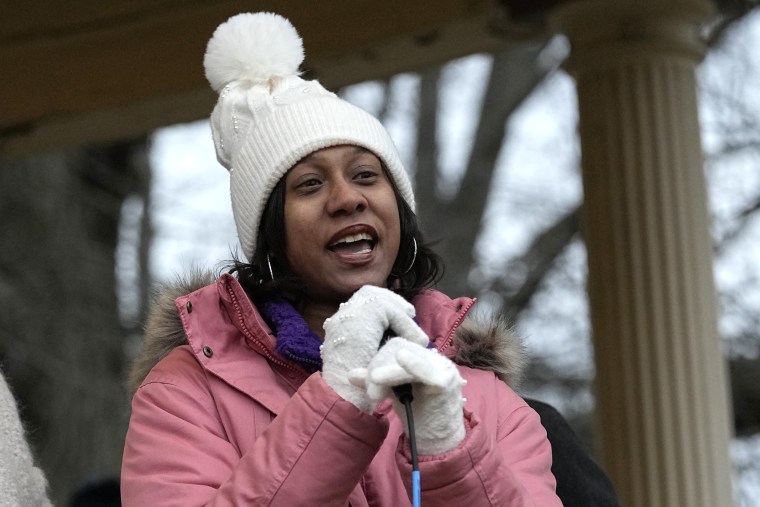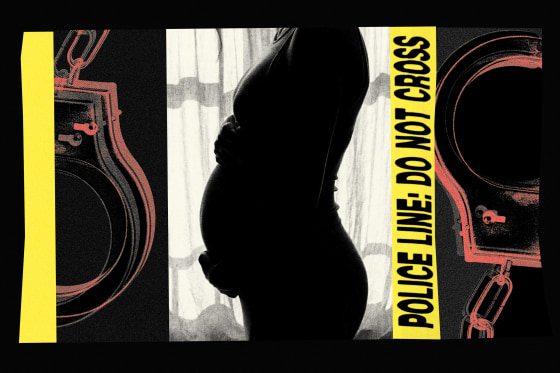On March 20 in rural Georgia, an ambulance responded to an early morning 911 call about an unconscious, bleeding woman at an apartment. When first responders arrived, they determined that she’d had a miscarriage. That was only the start of her ordeal.
Selena Maria Chandler-Scott was transported to a hospital, but a witness reported that she had placed the fetal remains in a dumpster. When police investigated, they recovered the remains and Chandler-Scott was charged with concealing the death of another person and abandoning a dead body. The charges were ultimately dropped; an autopsy determined Chandler-Scott had had a “natural miscarriage“ at around 19 weeks and the fetus was nonviable.
Still, Chandler-Scott’s arrest comes at a time when a growing number of women are facing pregnancy-related prosecutions in which the fetus is treated as a person with legal rights. And her experience raises troubling questions about miscarriages that happen in states with strict abortion laws, women’s health advocates say. How should remains be disposed of? And who gets to decide?
Georgia’s six-week abortion ban, the Living Infants Fairness and Equality (LIFE) Act, provides any fetus with a heartbeat legal recognition under the law.
Though the push for “fetal personhood” provisions like this one predates the 2022 Dobbs decision that overturned Roe v. Wade, experts say it has intensified since.
Roughly two dozen personhood bills have been introduced in the first three months of this year, according to the Guttmacher Institute, a research organization that supports reproductive rights.
Jill Wieber Lens, a professor at the University of Iowa College of Law and an expert on stillbirth and pregnancy loss, sees wider implications in Chandler-Scott's arrest. Research shows that 10 to 20 percent of known pregnancies end in miscarriage, most often in the first trimester.
“If what comes out of you in a miscarriage is a dead human body, and you can’t abandon that, you can’t put that in the trash, you can’t flush it down the toilet,” Lens said, “most people experiencing miscarriage are also apparently committing crimes in Georgia.”
Legal experts have drawn comparisons between Chandler-Scott’s arrest and that of Brittany Watts, a then-34-year-old woman in Warren, Ohio, who was charged with abuse of a corpse after her miscarriage in 2023, though the charges were later dropped.
In January, she filed a lawsuit against the city and hospital where she sought care. Neither the hospital nor the police responded to requests for comment, but the hospital filed a response in court, denying wrongdoing. The case is still pending.
In an interview last year, Watts said she feared a similar arrest could happen again. “As the old saying goes, ‘History repeats itself,’” Watts said. “I don’t want it to happen in this case.”

Advocates say the number of pregnant people facing criminal charges for conduct linked to pregnancy rose after Dobbs. At least 210 women were charged in the year that followed, according to a 2024 report from Pregnancy Justice, a reproductive rights group.
Women of color, lower-income women and women struggling with substance use are particularly vulnerable in interactions with authorities, advocates say.
Dana Sussman, senior vice president of Pregnancy Justice, an advocacy organization, said she was glad to hear that the charges against Chandler-Scott had been dropped. “On the one hand, this is terrific news,” she said. But “it doesn’t undo the very real harm and devastation charges like these bring in the first place.”
Chandler-Scott’s arrest is just one example of how Georgia is harming women's health and lives, said Monica Simpson, executive director of SisterSong, an Atlanta-based reproductive justice organization that has challenged the state's abortion ban in court. Last year, Amber Thurman died after she reportedly had to wait nearly a day for surgery that experts said could have saved her life.
“The picture that’s being painted in Georgia is a very grim one,” Simpson said. “Georgians are not asking for more restrictions, or more surveillance. We’re actually asking to have more health care, to have more access.”
Georgia recently held a hearing on a personhood bill that would have allowed people who end their pregnancies to be charged with murder. “We have turned Roe vs. Wade around. Let’s go ahead and just bring back life to the unborn,” Rep. Emory Dunahoo, a Republican, told an NBC affiliate. The bill died this week without a vote.
Sally Harrell, a Democratic state senator from Atlanta, speaking at the state Capitol this week, said the Chandler-Scott case “demonstrates the idiocy of fetal personhood.”
“This is terrifying for women of reproductive age in Georgia," she said.
The Tift County district attorney’s office, which handled Chandler-Scott’s case, did not answer a list of detailed questions from NBC News and referred instead to a press release about the charges being dismissed.
In that release, District Attorney Patrick Warren said his office had determined that the fetus had not been born alive and pursuing the case against Chandler-Scott was “not in the interest of justice.”
The office referred additional questions about the case to the police department, which did not respond.
A person answering a contact listed for Chandler-Scott said it was not her number. A relative did not immediately respond to requests for comment.
“In these sensitive moments of her life, it has caused not only her but her family emotional, financial and mental stress,” an online fundraiser for Chandler-Scott states.
Warren acknowledged in his press release that some in the community might be unhappy with his decision to drop the charges.
“This case is heartbreaking and emotionally difficult for everyone involved,” he said, “but our decision must be grounded in law — not emotion or speculation.”

